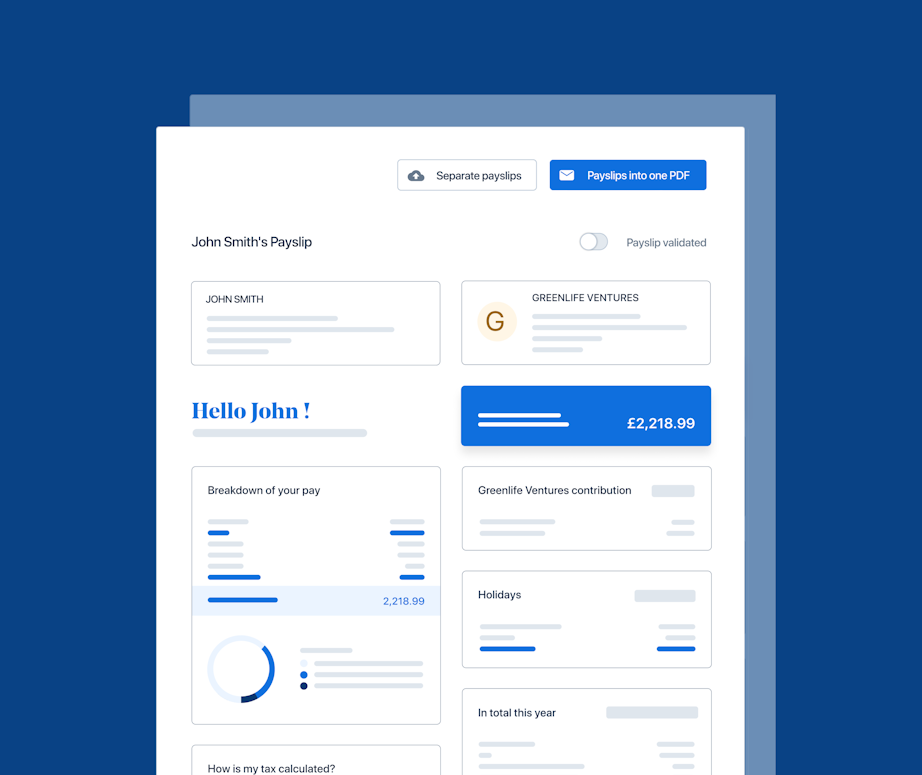Payroll Compliance in the UK: The Ultimate Guide and Checklist

Payroll Compliance. Although the topic is a wee bit dry, it’s essential for your organisation. Not only is dealing with non-compliance a costly business, but it also creates more work for your payroll team.
This blog explores UK payroll compliance and includes a payroll compliance checklist to help you avoid payroll law infringement. We’ll discuss how payroll software can make your life much easier to stay in HMRC’s good books and on the right side of UK payroll legislation.
What is payroll compliance?
In basic terms, UK payroll compliance is all about doing your payroll correctly and following the law - specifically, payroll legislation upheld by HMRC.
What does this look like in practice? Being HMRC compliant involves making sure your payroll numbers are accurate, payments are made on time, and deductions are free of errors.
If you fail to abide by this legislation, you can face some pretty hefty fines and penalties.
What payroll legislation are we talking about? Things like:
Reporting information to HMRC via RTI (PayFit helps you automate this)
Auto-enrolment (PayFit helps you to automate this, too)
Following regulations like GDPR compliance
Why is it important to comply with UK payroll legislation?
No one wants to be on the receiving end of a fine or penalty, and that’s precisely why you’ll want to comply with payroll legislation. And when we say fines, we’re not talking about £1,000 and a slap on the wrist. Companies have been fined millions for breaching basic data protection guidelines.
Non-compliance: what penalties can I accrue?
Here are some of the fines and penalties you could face when it comes to payroll in the UK:
Fines for late payments
If you don’t make payments through PAYE on time, you could face a fine(s) for late payment.
How much you’ll pay will depend on how late you’ve made your payment(s) and the amount of tax outstanding. To illustrate, if your payment is up to three months late, you could be charged 1% of the amount owed.
Penalty for incorrect reporting
Let’s say your FPS or EPS submissions contain some mistakes (say a staff member’s details are inaccurate, or you’ve recorded their earnings incorrectly). In the eyes of HMRC, this would be classed as inaccurate reporting, and a penalty would be charged based on the percentage of tax underpaid. Now, here’s the kicker. That percentage can range from 15% all the way up to 100% of the underpayment, depending on how severe the error(s) is.
Penalty for inaccurate record-keeping
HMRC requires businesses to keep payroll records up-to-date. If you don’t, then you could face up to £3,000 in fines based on the number of team members affected and how long you’ve been non-compliant.
So, how can you avoid accruing such stomach-churning payroll fines? By following this checklist, of course…
UK payroll compliance checklist
Now, who doesn’t love a checklist? They’re great for keeping on task and jogging your memory when you’ve got important things you can’t miss. Here’s a payroll compliance checklist to help you stay on top of your payroll and compliance.
PayFit top tip 🚀
Remember, every business is different - while this checklist is pretty comprehensive, you might want to add and expand on certain items to help your business stay on top of compliance even better.
Start with your payroll data
It all starts with data. Sounds pretty basic, but when you’re muddling through payroll manually, it can be easy to miss or incorrectly enter information into your system. So, before you do anything else on this checklist, you’ll want to check your employee data is up-to-date and accurate.
This includes verifying addresses and changes like promotions, marital status, salary adjustments, and tax code updates - anything that could affect payroll. With manual processes, these details can be overlooked, particularly in larger teams.
Key actions:
Reviewing and reconciling your payroll data should be a regular part of your payroll compliance routine. That way, you’ll catch discrepancies as soon as they crop up. Ensure your payroll records align with bank statements for accuracy. Also, consider using automated software that updates records in real time and minimises errors.
Before finalising payroll, you should double-check entries for hours worked, deductions, and tax withholdings. Accuracy here is crucial to avoid errors.
Stay on top of payroll deadlines
Half the battle of payroll is staying on top of key dates and deadlines. After all, payroll is a cycle that repeats every pay period and year. And managing this cycle requires attention to details like PAYE and RTI reporting deadlines.
However, having a calendar in place can do wonders for making this process more efficient. Coupled with good payroll software (we’re talking the kind that sends automatic submissions and reminders before important dates), this can automate a lot of the work involved.
Key Action:
Create an annual payroll calendar. Mark important dates such as payday and HMRC deadlines to prevent penalties for late submissions.
Keep up with payroll legislation
We know it’s not the most riveting thing to do. But understanding payroll legislation is crucial to ensure you remain payroll compliant. Even if you already have a pretty good understanding of current legislation, you’ll need to invest your time to ensure you stay up-to-date with the latest legislation.
So, how can you keep on top of ever-changing legislation?
Key Actions:
Regularly check HMRC’s employer bulletin
Join communities that cover payroll issues, like CIPP and attend their upcoming events
Follow payroll professionals and authority figures on LinkedIn for timely social updates.
Of course, don’t forget there’s payroll software, too.
Modern payroll solutions like PayFit automatically update legislative changes, ensuring compliance without manual intervention.
Leave a watertight audit trail
Audit trails really are the lifeblood of UK payroll compliance and proving accuracy in your payroll processes. They’re essentially a cookie trail of events, procedures and operational records that prove certain things happened. That way, if HMRC does come a knocking, you’ll have enough evidence to prove whether or not you’ve been payroll compliant.
Key actions:
Develop clear procedures for documenting changes in your payroll operations. This should include procedures for capturing all changes, the dates they were made by which users, and the reasons for changes.
Ensure data is stored safely and securely. Try to implement controls over access as well as encryption and authentication steps to protect your data from any unfriendly access.
Finally, ensure you keep all of this documentation ready in case of an audit. If this does happen, it can make all the difference in showing HMRC that you’re well-intentioned when it comes to compliance.
Get to grips with workplace pensions
Auto-enrolment came into our lives back in 2012. Since then, it's been your job as an employer, to make sure you understand your obligations.
Everyone’s contributions will differ, so doing this manually will induce headaches. So make it a priority to find software that helps you submit monthly contributions, processes new joiners and leavers, processes any refunds and sends auto-enrolment letters.
Key actions:
Assess Eligibility - Determine which employees are eligible for auto-enrollment in a workplace pension scheme based on their age, earnings, and employment status.
Get familiar with contributions - Understand the minimum contribution levels: employers contribute 3% of an employee’s qualifying earnings, and employees contribute 8%, including at least 3%
Choose a good pension scheme - Select a compliant pension scheme. Popular options include NEST, The People’s Pension, and Smart Pension.
Managing Opt-In and Opt-Out Requests - Maintain accurate records of all pension-related requests and ensure timely submission of contribution files by the 22nd of each month.
Don’t forget about expenses and deductions
One of the most common areas where small businesses fall short of payroll compliance is deductions and expenses. Are deductions being taken correctly? Do the expenses your team members claim comply with HMRC regulations? Any discrepancies here can result in under or over-payments of taxes.
Key actions:
Keep all receipts. This is something team members will need to do anyway to claim their expenses. Without these, HMRC is more likely to poke holes through expense claims.
Have a sound process for approaching and authorising expenses. If this doesn’t happen, you're more likely to get unauthorised or excessive expense claims. Establishing a clear approval workflow can work wonders here.
Payroll compliance checklist - bonus actions
Get feedback from employees
While not something you strictly need to do from a compliance perspective, it’s a very good idea. That’s because sometimes, you can’t see the wood for the trees. But asking those who might experience your payroll process differently can help you identify and resolve any problems (such as underpayments) before they become serious.
This feedback process might also highlight knowledge gaps on your employees’ behalf. That might mean you need to run a refresher course on uploading expenses into your systems to ensure everything is running smoothly on their end.
Implement automated payroll software
Software genuinely makes everything easier, more streamlined and more efficient. You’ll want to find one that not only makes running payroll a doddle but also ensures you’re always fully payroll compliant.
It’s important to look for a platform that guarantees things like GDPR compliance - a system that is ISO 27001 certified is a good place to start.
Being able to keep up with payroll legislation is a plus as well. Look for a system that can automate things like RTI and pension submissions so you don’t have to remember to do these every month.
Last but not least, don’t forget about support. It’s all good to have a shiny new payroll software, but if you’re not confident in using it or run into an issue, you want to know there’s another human on the other side who can help. Here at PayFit, we have a team of qualified CIPP-qualified payroll experts on hand to answer any questions you might have.
Curious to say some payroll software in action? Why not sign up for a PayFit demo? Our friendly product experts can help you explore whether switching to payroll software could be the right decision for your business.
How To Work Out Hourly Rates In The UK - An Employers' Guide
Recruitment Process Guide - Stages, Selection, Automation
Employee Contracts - A Guide For UK Businesses
Part Time Workers' Holiday Entitlement - Guide & Calculator








